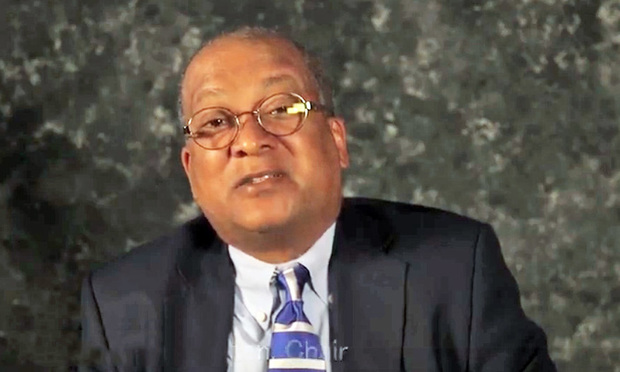Judicial Watchdog Calls Justice a 'Bully Who Preyed for Years on Women' in Closing
In a disciplinary hearing in front of the Commission on Judicial Performance, lawyers for Second District Justice Jeffrey Johnson said there's no credible evidence of any actual romantic relationship, and that the courthouse environment forced staff to pick a "team."
October 08, 2019 at 08:14 PM
6 minute read
 Justice Jeffrey Johnson
Justice Jeffrey JohnsonIf Second District Court of Appeal Justice Jeffrey Johnson was preying on young women for sex, then he's the worst predator in the history of the judiciary, his lawyer told a watchdog agency Tuesday.
Johnson might have complimented court staff and outside attorneys on their looks and dress, and invited them to his chambers, Paul Meyer of the Law Offices of Paul S. Meyer told three special masters for the Commission on Judicial Performance at closing arguments in Johnson's judicial discipline case. But there's no credible evidence he wound up having a romantic relationship with any of them, Meyer said.
"There is no next step that is ever taken with these witnesses," Meyer said. "It never happens."
Several witnesses, including Johnson's Second District colleague Justice Victoria Chaney, did testify over the course of a month-long hearing that Johnson propositioned them and/or touched them inappropriately.
Johnson, commission examiner Emma Bradford told the masters Monday, is "a bully who preyed for years on women, lied about it for years, and continues to lie about it and refuses to take responsibility for his action."
More than a dozen women, many with no previous connection to each other, stepped forward to testify. "None of these women gain anything by lying," Bradford said. "Their names are now part of the public record" and Johnson has dragged them through the mud.
Meyer said it's no longer true that women have nothing to gain from accusing powerful men of harassment. "That's not the world we're living in in 2018, 2019," Meyer said. In the MeToo era, women are often perceived as "heroines" for stepping forward.
Plus, once Elwood Lui, the administrative presiding judge of the Second District, began investigating allegations—and inadvertently broadcasting them via email—staff might have felt they had to pick "a team," Meyer said.
"You know, the administration of justice … it's lifelong friendships, loyalties, bonding, and all of these things have the effect of [choosing] one group or another," he said.
Fourth District Justice Judith Haller, Los Angeles Superior Court Judge Louis Hanoian and Imperial County Judge William Lehman are acting as special masters for the commission. Tuesday's session was held in the Fourth District's San Diego courtroom.
Chaney testified in August that Johnson would grab her breasts while hugging her, and once propositioned her at a hotel in Reno, Nevada. Weeks later, while in his chambers discussing a case, Johnson told her, "We should have an affair. We're perfect together," according to Chaney.
Johnson admitted that he made comments about an employees' looks, tattoos and boyfriends, stating that he was trying to be supportive, chivalrous or just curious. "I've learned over the course of the past year, I had too much curiosity," he testified, but said it was "innocent curiosity." He denied Chaney's allegations, saying it was she who propositioned him. He called the allegations against him insulting and racist.
Bradford began her closing by conceding that the examiner will not be asking for a finding of willful misconduct, the most serious disciplinary charge that can be leveled against a California judge, because it's clear none of the alleged conduct occurred in Johnson's official role. The examiner is leveling the next most serious charge, "conduct prejudicial to the administration of justice that brings the judicial office into disrepute," which is still a removable offense.
Specifically, Bradford argued that Johnson was not dignified and courteous in his interactions with court staff, and that he lent the prestige of judicial office to advance his personal interests. She gave the specific example of a young attorney who was looking for a recommendation for a city attorney job. Johnson allegedly brought her to his chambers after hours and told her she looked fit and beautiful. "That to me is the very definition of impropriety and the appearance of impropriety," she said.
Johnson also displayed gender bias in violation of the canons. Staff were "quite clearly subject to disparate treatment based on the fact that they are women," she said.
She contended that Johnson has been on notice that his comments on women's looks are inappropriate for the workplace since receiving a warning 25 years ago as an assistant U.S. attorney.
Bradford said the evidence at trial showed that Johnson often told younger attorneys over whom he exercised some control, "If only I'd met you at a different time." Others testified that he inappropriately touched their arms or thighs.
Most of the witnesses told friends, relatives or colleagues about the behavior at the time it occurred, long before the Second District or the commission began investigating. "The weight of the evidence is that these women did not misconstrue," Bradford said. "They called it at the time. They called it what it was."
They had nothing to gain from coming forward, Bradford said. As for Chaney, "Exactly what she feared would happen if she came forward has happened: that Justice Johnson would claim that she was coming on to him." And that the court's reputation as a whole would be damaged, she said.
Meyer said Bradford was credulously taking all the testimony at face value. "Accepting the fact here as fresh and clean and independent would be completely wrong," he said.
Some of the staff members compared notes with each other or with Chaney before their interviews with the commission, Meyer said. Rather than being outcast, the accusers could get "a social benefit, a professional benefit" from lining up with the people accusing Johnson, he claimed. Given the atmosphere around the courthouse, he said, the question became, "Which team are you on?"
One witness, he said, initially told court staff that while Johnson was "overly friendly," she wasn't offended by his conduct. When interviewed by commission staff this year, she expressed concern that she was being "groomed" by Johnson "as a result of all the emails, all the news articles," he said.
"Our view is that this contagion has permeated through the case," he said.
The MeToo movement has added to that effect, he said. "People are free to recharacterize events and be rewarded for it."
This content has been archived. It is available through our partners, LexisNexis® and Bloomberg Law.
To view this content, please continue to their sites.
Not a Lexis Subscriber?
Subscribe Now
Not a Bloomberg Law Subscriber?
Subscribe Now
NOT FOR REPRINT
© 2025 ALM Global, LLC, All Rights Reserved. Request academic re-use from www.copyright.com. All other uses, submit a request to [email protected]. For more information visit Asset & Logo Licensing.
You Might Like
View All
'It's Not Going to Be Pretty': PayPal, Capital One Face Novel Class Actions Over 'Poaching' Commissions Owed Influencers

'Tragedy of Unspeakable Proportions:' Could Edison, DWP, Face Lawsuits Over LA Wildfires?
7 minute read

Meta Hires Litigation Strategy Chief, Tapping King & Spalding Partner Who Was Senior DOJ Official in First Trump Term
Trending Stories
- 1'It's Not Going to Be Pretty': PayPal, Capital One Face Novel Class Actions Over 'Poaching' Commissions Owed Influencers
- 211th Circuit Rejects Trump's Emergency Request as DOJ Prepares to Release Special Counsel's Final Report
- 3Supreme Court Takes Up Challenge to ACA Task Force
- 4'Tragedy of Unspeakable Proportions:' Could Edison, DWP, Face Lawsuits Over LA Wildfires?
- 5Meta Pulls Plug on DEI Programs
Who Got The Work
Michael G. Bongiorno, Andrew Scott Dulberg and Elizabeth E. Driscoll from Wilmer Cutler Pickering Hale and Dorr have stepped in to represent Symbotic Inc., an A.I.-enabled technology platform that focuses on increasing supply chain efficiency, and other defendants in a pending shareholder derivative lawsuit. The case, filed Oct. 2 in Massachusetts District Court by the Brown Law Firm on behalf of Stephen Austen, accuses certain officers and directors of misleading investors in regard to Symbotic's potential for margin growth by failing to disclose that the company was not equipped to timely deploy its systems or manage expenses through project delays. The case, assigned to U.S. District Judge Nathaniel M. Gorton, is 1:24-cv-12522, Austen v. Cohen et al.
Who Got The Work
Edmund Polubinski and Marie Killmond of Davis Polk & Wardwell have entered appearances for data platform software development company MongoDB and other defendants in a pending shareholder derivative lawsuit. The action, filed Oct. 7 in New York Southern District Court by the Brown Law Firm, accuses the company's directors and/or officers of falsely expressing confidence in the company’s restructuring of its sales incentive plan and downplaying the severity of decreases in its upfront commitments. The case is 1:24-cv-07594, Roy v. Ittycheria et al.
Who Got The Work
Amy O. Bruchs and Kurt F. Ellison of Michael Best & Friedrich have entered appearances for Epic Systems Corp. in a pending employment discrimination lawsuit. The suit was filed Sept. 7 in Wisconsin Western District Court by Levine Eisberner LLC and Siri & Glimstad on behalf of a project manager who claims that he was wrongfully terminated after applying for a religious exemption to the defendant's COVID-19 vaccine mandate. The case, assigned to U.S. Magistrate Judge Anita Marie Boor, is 3:24-cv-00630, Secker, Nathan v. Epic Systems Corporation.
Who Got The Work
David X. Sullivan, Thomas J. Finn and Gregory A. Hall from McCarter & English have entered appearances for Sunrun Installation Services in a pending civil rights lawsuit. The complaint was filed Sept. 4 in Connecticut District Court by attorney Robert M. Berke on behalf of former employee George Edward Steins, who was arrested and charged with employing an unregistered home improvement salesperson. The complaint alleges that had Sunrun informed the Connecticut Department of Consumer Protection that the plaintiff's employment had ended in 2017 and that he no longer held Sunrun's home improvement contractor license, he would not have been hit with charges, which were dismissed in May 2024. The case, assigned to U.S. District Judge Jeffrey A. Meyer, is 3:24-cv-01423, Steins v. Sunrun, Inc. et al.
Who Got The Work
Greenberg Traurig shareholder Joshua L. Raskin has entered an appearance for boohoo.com UK Ltd. in a pending patent infringement lawsuit. The suit, filed Sept. 3 in Texas Eastern District Court by Rozier Hardt McDonough on behalf of Alto Dynamics, asserts five patents related to an online shopping platform. The case, assigned to U.S. District Judge Rodney Gilstrap, is 2:24-cv-00719, Alto Dynamics, LLC v. boohoo.com UK Limited.
Featured Firms
Law Offices of Gary Martin Hays & Associates, P.C.
(470) 294-1674
Law Offices of Mark E. Salomone
(857) 444-6468
Smith & Hassler
(713) 739-1250






